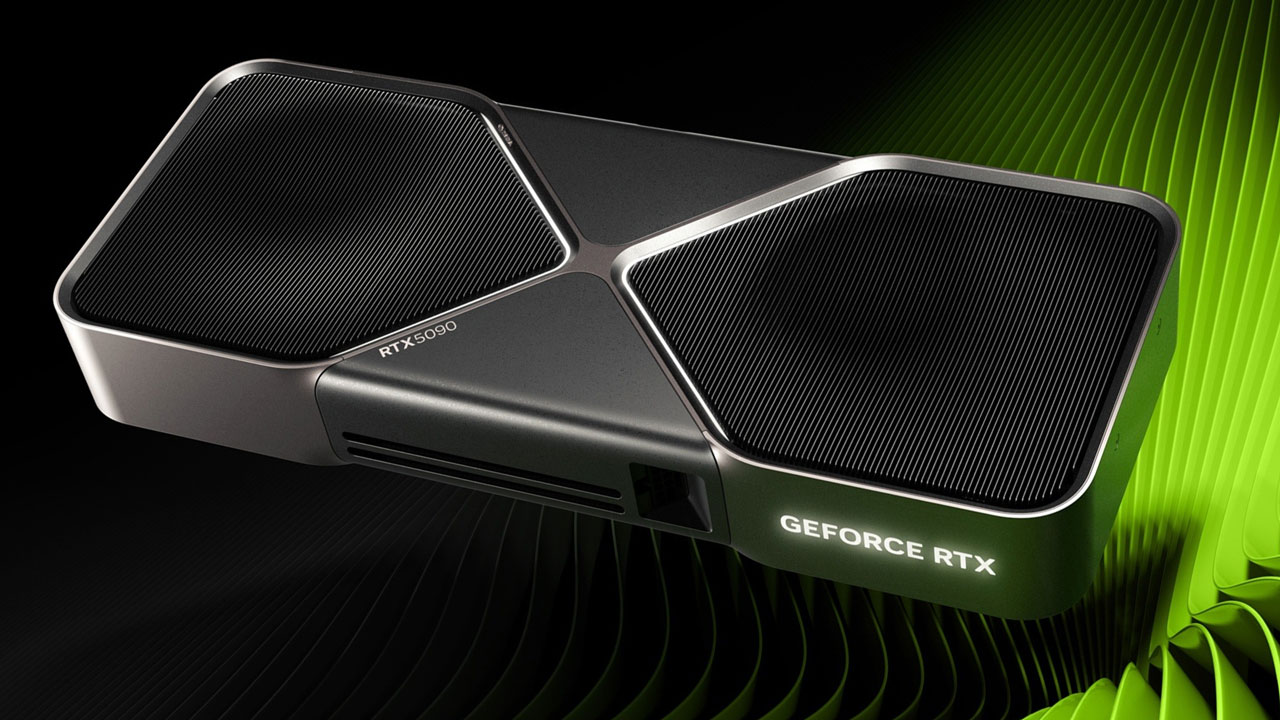RTX 5090 exhibits 27% higher CUDA performance than RTX 4090 — exceeds 500K points in Geekbench
The RTX 5090 costs almost 25% more, though.

Nvidia's RTX 50 series will debut with the RTX 5090 and RTX 5080 starting January 30. While official reviews, including ours, are under embargo, a potential leak has surfaced that suggests a modest 30% improvement over the last generation. The RTX 5090 has reportedly been benchmarked in Geekbench 5 (via Benchleaks) using the CUDA API, likely by a reviewer who inadvertently made the test results public. As always, spread some salt over this leak, even though the performance claims are similar to what Nvidia has depicted in its slides.
The test bench features AMD's Zen 4-based Ryzen 9 7900X with 12 cores / 24 threads and an Asus ProArt X870E Creator WiFi motherboard. The system has 32GB of DDR5-6000 memory and uses Windows 11 Pro as the Operating System for this test. The benchmark was carried out using the CUDA API, the results of which are hard to come by as Geekbench does not publicly maintain a database for CUDA benchmarks.
We've gathered a few RTX 40 numbers to give you a general performance overview; however, your results might differ slightly. Remember that Geekbench is just a synthetic benchmark and may not accurately reflect how this GPU performs in real-world scenarios.
The RTX 5090 amasses 542,157 points in the CUDA API, landing a solid 27% lead over its predecessor, the RTX 4090. This isn't a massive leap generation-on-generation as we're used to seeing, plus the RTX 5090 has 32% more CUDA cores than the RTX 4090. Then you have the apparent elephant in the room: the pricing. Nvidia's $1,999 price tag for the RTX 5090 makes it roughly 25% more expensive than the RTX 4090, assuming you got one at MSRP. Again, this is leaked information, so almost everything you see here is subject to change.
| GPU | CUDA Cores | VRAM | Memory Type | Memory Speed | Bus Width | Bandwidth | CUDA Score | % vs RTX 5090 |
|---|---|---|---|---|---|---|---|---|
| RTX 5090 | 21,760 | 32GB | GDDR7 | 28 Gbps | 512-bit | 1.79 TB/s | 542,157 | 100.00% |
| RTX 4090 | 16,384 | 24GB | GDDR6X | 21 Gbps | 384-bit | 1.01 TB/s | 424,332 | 78.27% |
| RTX 4080 | 9,728 | 16GB | GDDR6X | 22.4 Gbps | 256-bit | 0.71 TB/s | 300,728 | 55.47% |
The GB202, which powers the RTX 5090, is 744mm2 and has roughly 92 billion transistors. This equates to around 123 million transistors per mm2 on the updated 4NP process, similar to the 4N used on Ada Lovelace. The L1 and L2 cache sizes per SM also show slight improvement, compensated by the faster GDDR7 memory. Nvidia claims a 2x increase in performance over the RTX 40 series, suggesting that an RTX 5070 equals an RTX 4090, but this requires enabling Multi Frame Generation.
Conversely, the RX 9070 XT from AMD has been rumored to match the RTX 4080 Super in raster performance. All that power has been crammed into a near-390mm2 Navi 48 chip, expected to be priced around $500. AMD has been tight-lipped about RDNA 4, though we might hear more from them in February when the mid-ranged RTX 5070 hits shelves and AMD finalizes its pricing strategy.
Get Tom's Hardware's best news and in-depth reviews, straight to your inbox.

Hassam Nasir is a die-hard hardware enthusiast with years of experience as a tech editor and writer, focusing on detailed CPU comparisons and general hardware news. When he’s not working, you’ll find him bending tubes for his ever-evolving custom water-loop gaming rig or benchmarking the latest CPUs and GPUs just for fun.
-
redgarl It is even worst than that because the only comparison we have is with Cyberpunk with Path Tracing showing 27FPS on the 5090 vs 21.6 FPS on the 4090, which is about 30%.Reply
Since the 5090 have 50% more RT cores over the 4090, you need to take that into account and the raster performance will ultimately be less than 30%.
30% will make Blackwell the WORST generational uplift ever from Nvidia.
https://i.ibb.co/4fks6Gt/reality.jpg -
derekullo I'm still using a 3080Ti.Reply
Moral of the story is don't automatically upgrade to the latest graphics card.
Shame mine isn't listed on the chart above, but according to https://technical.city/en/video/GeForce-RTX-3080-Ti-vs-GeForce-RTX-5090, the 5090 is on paper at least double the speed of the 3080 Ti. -
AngelusF Reply
And when you factor in the higher power consumption, the increase measured in FpS per Watt will be even less. Or maybe even a decrease?redgarl said:30% will make Blackwell the WORST generational uplift ever from Nvidia.
The only thing that attracts me about the 5090 is the memory. Or at least it would attract me if it had 48GB instead of 32GB. -
ekio Yes, the real performance difference is here: 25~30 ish percents.Reply
I always found people lame being disappointed when a new generation is improved so much that their own hardware feels outdated. That's such a selfish point of view.
As a 4090 owner, not planning to buy any 5090, I was still deeply hoping that they could achieve a much better improvement, and push the overall GPU world to new standards, especially regarding efficiency. But that didn't happen.
If you compare the perf and the core amount ratio, there is almost no progress to see, it's just 25 percent more cores, 25 percent more perf...
And the price to performance ratio is not improving much, neither... -
VizzieTheViz So basically they’ve made the 4090 about 25% bigger with some more ram and an even more ridiculous pricetag.Reply
Performance seems to scale linearly if your not using frame generation stuff.
That’s a great GPU but not really a great deal for me as a gamer. I’ll get an 9070XT or an 7900XTX or something and nvidia can try again in about five years. -
DougMcC Reply
It's indeed not much of a deal for gamers. It seems like it is much more targeted at people for whom running AI stuff is the principal concern.VizzieTheViz said:So basically they’ve made the 4090 about 25% bigger with some more ram and an even more ridiculous pricetag.
Performance seems to scale linearly if your not using frame generation stuff.
That a great GPU but not really a great deal for me as a gamer. I’ll get an 9070XT or an 7900XTX or something and nvidia can try again in about five years. -
tamalero Reply
doesnt this just showcases that blackwell was designed 95% for datacenter and AI than actual gaming performance? they are trying to cover for it by throwing DLSS 4AngelusF said:And when you factor in the higher power consumption, the increase measured in FpS per Watt will be even less. Or maybe even a decrease?
The only thing that attracts me about the 5090 is the memory. Or at least it would attract me if it had 48GB instead of 32GB. -
CelicaGT So, if I'm reading this right....there may some zero gains and possible performance regression in the mid tier cards with regards to pure raster. (When comparing core counts, clock speed, and theoretical FP32 performance) We'll find out for sure soon but yikes, no wonder they're pushing DLSS and Multi Frame Gen so hard.Reply -
Eximo Reply
On paper the 4080 Super and 5080 are very similar. So just the generational uplift with most of the architecture changes going to DLSS, yes.CelicaGT said:So, if I'm reading this right....there may some zero gains and possible performance regression in the mid tier cards with regards to pure raster. (When comparing core counts, clock speed, and theoretical FP32 performance) We'll find out for sure soon but yikes, no wonder they're pushing DLSS and Multi Frame Gen so hard.
4090 -5090 they added a lot more.
Still room for a 5080 Ti (or just the 5090D released outside of China) -
CelicaGT Reply
As long as the pricing is in line, these could still be decent cards. I tend to ignore model tiers and strictly decide on price performance. On a 4070Ti currently and I'm eyeing anything with 16GB+ and at least a 50% performance uplift in raw raster. I'll be waiting until RDNA 4 cards are released before doing anything regardless.Eximo said:On paper the 4080 Super and 5080 are very similar. So just the generational uplift with most of the architecture changes going to DLSS, yes.
4090 -5090 they added a lot more.
Still room for a 5080 Ti (or just the 5090D released outside of China)